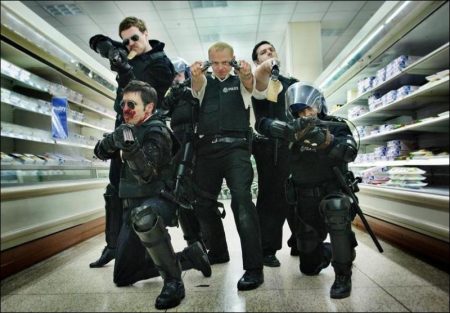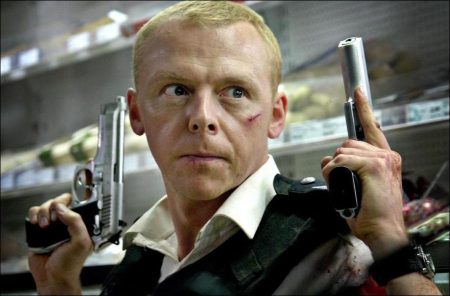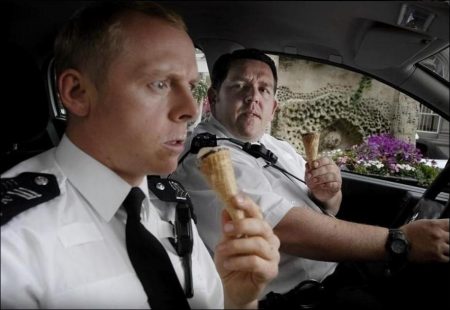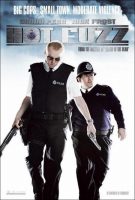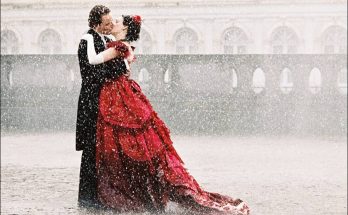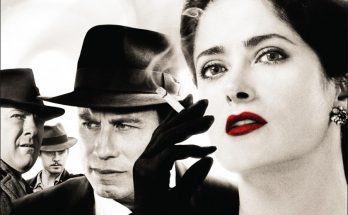Taglines: They’re bad boys. They’re die hards. They’re lethal weapons. They are…
Police constable, Nicholas Angel (Simon Pegg) is good at his job, so good in fact, he makes everyone else look bad. As a result, his superiors at the Met have decided to sweep him under the carpet. So it is that London’s top cop finds himself in the sleepy West Country village of Sandford. With garden fetes and neighborhood watch meetings replacing the action of the city, Angel struggles to adapt to his situation and finds himself partnered with Danny Butterman (Nick Frost), an oafish but well meaning young Constable, who dreams of being Mel Gibson. Just as all seems lost, a series of grisly accidents motivates Angel into action. Convinced of foul play, Angel realises that Sandford may not be as idyllic as it seems.
Hot Fuzz is the action-packed new comedy from the makers of the hit movie `Shaun of the Dead’. Nicholas Angel (Simon Pegg) is the finest police officer London has to offer, with an arrest record 400% higher than any other officer on the force. He’s so good, he makes everyone else look bad. As a result, Angel’s superiors send him to a place where his talents won’t be quite so embarrassing – the sleepy and seemingly crime-free village of Sandford.
Shaun Of The Dead – the self-styled romzomcom that Edgar Wright and Simon Pegg co-created in 2004 as a follow-up to their award-winning collaboration on the hugely successful Channel 4 sitcom, Spaced – was a hit at the box office (grossing £40 million worldwide).
The Genesis of Hot Fuzz
This film also won several prestigious industry awards, including Best Screenplay at the 2004 British Independent Film Awards, Best Horror at the Saturn Awards and Best British Film at the 2005 Empire Awards. It also picked up two nominations at the 2005 Baftas: producer Nira Park for the Carl Foreman Award for Most Promising Newcomer, while the film itself picked up a nomination for the Alexander Korda Award for Best British Film.
All these plaudits, though, gave Pegg, Wright, and their extended creative team, an instant headache: how could they follow it up? The answer, as it turned out, had more than a close link to Wright’s past. Growing up in the small city of Wells in Somerset, Wright had been an inveterate watcher of cop movies, often staying up through the night to get his fix. “I didn’t have a video recorder until I was 17,” laughs Wright. “I stayed up and watched TV. I did have a particular fixation with the cop films, particularly any of the Dirty Harry films, any of the gritty 60’s and 70’s films like Bullitt and The French Connection and all the 80’s films like Lethal Weapon and Die Hard.”
Also a prolific amateur film-maker, Wright parlayed all his knowledge into a cop movie called Dead Right, made when he was just 18. When he and Pegg were discussing their first post-Shaun project, a number of ideas came up, but Wright still had a cop movie itch to scratch and so proposed that they do for the action movie what Shaun Of The Dead had done for the zombie movie: strain a particularly American genre through a peculiarly British collander, add lumps of humour and serve.
“There’s a great tradition of British crime films, but hardly any British cop movies, so that is what we’re hoping to address,” explains Wright. “And very few British cop movies actually use the iconography of the uniformed policeman. If you talk to people from other countries, they say, “they’re so cute with their helmets and isn’t it funny, they haven’t got any guns.” So how do we a) make a big British genre film about British bobbies and b) how do we get lots of guns into it?”
The answer they hit on was to go one bigger than Shaun Of The Dead and make a hugely ambitious action movie featuring Pegg in the lead role as crusading cop, Nicholas Angel. Working Title, who had gambled successfully on Shaun of the Dead after Wright and Pegg had pitched it as ‘Richard Curtis shot through the head by George Romero’, were more than happy to reacquaint themselves with the Shaun team, and this time the pitching process was relatively straightforward.
“Simon and Edgar pitched the idea verbally and Working Title said yes straightaway, and they started writing” explains Nira Park, who produced Hot Fuzz with Working Title’s Eric Fellner and Tim Bevan, and who also produced both Shaun of the Dead and Pegg and Wright’s seminal sitcom, Spaced. “It felt very different this time round knowing that at the end of the writing process the film would definitely be made. With Shaun, we never quite knew and the year after FilmFour (who developed SOTD) collapsed we really struggled to get it financed and it almost didn’t get made, so I think knowing that Working Title were behind us from the beginning this time round made it easier.”
The writing process began with a period of intensive ‘research’ during which Pegg and Wright waded their way through a list of cop movies, rewatching their favourites for inspiration. Of the 200 or so movies that were on the list – “it’s great buying cop films from HMV and knowing that you can genuinely claim them back against tax!” laughs Wright – notable names included Freebie & The Bean, Lethal Weapon, Die Hard, 48 Hours, Busting, The Last Boy Scout, To Live And Die In L.A., Extreme Prejudice, The Super Cops, British classic The Blue Lamp, Point Break and Bad Boys 2.
The latter two, in fact, are directly referenced in the movie, forming an important part of Danny Butterman’s DVD collection. “There’s a bit where Nicholas and Danny are watching Bad Boys 2 and something that Martin Lawrence says has relevance to what’s going on in our film,” giggles Pegg. “So when we wrote the script we actually had a bit where Martin Lawrence says ‘this shit just got real’ like he’s commenting on our plot.”
However, the film really took shape after an intense period during which Wright and Pegg shadowed police officers in London, Somerset, Gloucestershire and Wiltshire. “We interviewed lots of officers in London and we also toured about 15 rural stations. We then spent a week interviewing different police officers and that was brilliant because they were so helpful and so candid, and lots of amazing details came out,” says Wright.
Many of those details made it into the film, such as a brief mention of a hierarchy of sugary snacks which tardy officers are forced to buy, while Angel’s police number came from a real-life PC who Wright and Pegg accompanied on an eventful ride-along. “We were driving down a country lane in Somerset when a voice came over the radio with an alert. The PC stuck on the `Blues and Twos’ and we went hurtling down this country lane at 85 mph. Me and Edgar were like ohmigod!”
Fully stocked up on anecdotes and research, the duo set about writing the script, initially working out what Pegg calls the “willfully labyrinthine” plot on a series of index cards and a flipchart in the London office of their production company, Big Talk. But the distractions of living in London soon proved impractical and they retreated to a rented flat in Wells to finish the draft.
Getting Into Shape for Hot Fuzz
With its combination of car chases, fist fights, gunplay, horse-riding, and general athleticism, Pegg knew that Hot Fuzz would present something of a physical challenge for him as an actor. Not that it necessarily occurred to him while writing it. “When you write, you’re just writing specifically from the point of view of a particular character,” he explains. “When I was doubled up in agony because I’d strained both my quad muscles running down the High Street, I was thinking ‘you fucking bastard! Why did you write this ten mile chase sequence for Angel!’ but at the time of writing you’re just thinking about what’s going to look good on-screen, you almost forget that it’s going to be you who has to do the running.”
To get into shape for filming, Pegg embarked upon a period of intensive physical training that required the attention of no fewer than three personal trainers and a strict diet that forbade him from eating after 8pm during shooting. During location shooting in Wells, he also decided to run the two miles from the rented cottage he shared with Frost to unit base every morning. Frost, on the other hand, decided that for his character, a strict physical regimen wasn’t a necessity. He took the car. “I would wave to Simon as we drove past,” he recalls. “I never once stopped to give him a lift!”
Frost’s maverick approach to preparation also saw him ignore a list of movies that Pegg and Wright gave him to watch. “I saw Bad Boys 2 and that was it,” he admits. But once it came down to the serious business of handling guns, Frost loved every minute. “I love guns. I love rough and tumble,” he says. “I’ve been practising being an action hero for 25 years. It felt great. I always try to take these things in my stride but when you’ve got two lovely handguns, you’re wearing a flak jacket and your best mate’s beside you, you can’t help but walk with a swagger.” In fact, Frost and Pegg got so fond of their guns they christened them ‘Emma’ and ‘Sarah’…
Fuzz on Location – Shooting in Wells
Although Hot Fuzz started filming in London, the brunt of the shoot mirrored the events of the movie and moved to a quiet, beautiful West Country location: Wright’s home town of Wells. The director claims that this hadn’t been his intention from the off. “Subconsciously, maybe,” he tentatively admits. “Wells is a city and the fictional Sandford is a village, so we were making it look smaller than it is. But it was good for us, being there.”
With its cathedral, regular market and cobbled streets, Wells was a perfect choice to stand in for the tranquil (although much smaller) Sandford, but even when Wright moved it onto his wishlist, he didn’t think it was a viable choice. “I thought it would be too expensive – it’s quite a tourist destination and it has the cathedral and twice weekly markets and so I thought it would be quite difficult,” he continues. “We went on a location scout last year around Devon, Dorset, Cornwall, Wiltshire and Gloucestershire, looking for places. We had a shortlist and then ironically Wells was the one that was the most receptive.”
Once filming began, the production crew – many of whom have worked with the team since Spaced, reinforcing the familial feeling on set – frequently had to shut down the town square and surrounding streets to shoot major setpieces, from a massive, pivotal church fete scene requiring masses of extras, to action sequences and shoot-outs galore, while the ever-present spectre of rain (“the real reason why they don’t make action movies in Britain,” grumbles Wright) pushed filming back by a few days. But the denizens of Wells took it all in their stride, with the local am-dram society helping out when a casting crisis arose at the eleventh hour, while local crowds weren’t fazed by staged gunfights and the sight of Pegg riding through the town square on a horse.
Wright spent a fair amount of time greeting old friends, teachers and his visiting parents. “On the first day there, we were doing a night shoot right in the middle of the town square. At 11pm, people were still watching the filming,” he remembers. “But by midnight, it was completely deserted. Not just no people but no cars. It was so weird being back in your hometown with it feeling like a massive set because there was nobody there!”
Popcorn Logic: The Style and Structure of Hot Fuzz
Eschewing the usual three-act structure employed by most action movies, Hot Fuzz takes a very different approach, with Pegg and Wright splitting the movie into two very distinct sections: the first features a deliberate restraint and focus on inactivity as Angel is forced to deal with missing swans, church fetes and a village in which nothing of any note seems to happen… save, it must be said, a few suspicious deaths which Angel begins to believe are far from being accidents.
The second half of the film, in which Angel decides to take arms against a sea of troubles, sees the film shift into top gear with a series of shoot-outs, car chases, explosions and John Woo-esque gunplay. “We didn’t want to destroy the idyll of the gentle English countryside by having it too over-the-top right from the start,” explains Wright. “The tone shifts slowly. Essentially, the film is structured around the development of Simon and Nick’s characters, their relationship is at the heart of the film. “The big dramatic shift actually happens before anything kicks off,” continues Wright. “Danny makes Nicholas watch Point Break and Bad Boys 2 back-to-back and because it’s late, they both fall asleep in front of Bad Boys 2. I like the idea that even though they’re asleep, the Michael Bay-isms are permeating their subconscious. After that point Nicholas becomes more like a badass cop!”
From the off, Pegg and Wright knew that this sudden shift in tone and pace might take audiences by surprise. To explain the evolution from quaint British murder mystery into explosive American-style action movie, the duo came up with a defining descriptive phrase: popcorn logic.
“It’s Bruckheimer’s Law,” laughs Pegg, referring to action movie producer Jerry Bruckheimer. “Popcorn logic is our way of excusing bad continuity! No, we’re always very thorough about the logic of the plot, about how everything has to be feasible. But with popcorn logic, we started to take on board this idea that a lot of overblown action films demand that you suspend your disbelief a little bit more. We wanted to do both and so at times we did things that were purposefully unlikely. We’d fly through the air for ten seconds firing guns, for example. And the end is just crazy – it’s like a videogame and there are lots of levels they have to go through before reaching the Big Boss at the end.”
Sedate though the first half of the movie may be Wright’s directorial style ensures that it’s far from dull. “He never fails to amaze me. He’s a machine. He absolutely will not stop,” says Pegg. “The amount of rigs we had on this film, I’ve never seen before. We had a camera on a rickshaw, we had a camera on a Segue, like GOB rides in Arrested Development. Edgar’s always trying to evolve his style. He’s done some fabulous stuff with flashbacks and that classic Brian De Palma thing where, as in Dressed To Kill, you revisit a scene you’ve seen before but you notice something else in the shot that you didn’t get to see the first time.”
De Palma isn’t the only director that the prodigiously talented Wright pays homage to in Hot Fuzz, with nods to everybody from Tony Scott to Dario Argento studded throughout the movie. “I wanted to re-immerse myself in all my favourite cop and action films and shoot it in that style, so this small town story is given the expansive big screen feeling of a Michael Mann film,” explains Wright. Yet it’s not just the gunfights that will receive the Hollywood treatment. “When we interviewed police officers and asked what the one part of the job is that you never see dramatised on film, they all said the paperwork,” laughs Wright. “And you go into these stations and for any offence, be it major or minor, you see them all hunched over a desk filling out endless forms. So there is a lot of paperwork in the movie but it’s done Man On Fire style! In terms of the visual language, this is all about the idea of taking quite mundane aspects of the police job and trying to make them look really flashy and muscular.”
Hot Fuzz – The Title
And so, the last question: how did Hot Fuzz end up as the title for the film? “The title is wilfully stupid!” laughs Pegg, pinning the responsibility firmly on Wright. “It’s Edgar’s title. He just wanted to appeal to that mid-to-late 70’s trash exploitation stuff like Fuzz and Superfuzz and Freebie and the Bean, titles like that. But I really like it – Hot Fuzz is the opposite of Snakes On A Plane, it tells you fuck all about the film.
It’s essentially a tribute to the two-word titles of the 80’s and 90’s that sometimes, but not always detail the plot or spirit of the film,” adds Wright. “Die Hard, Lethal Weapon and Sudden Impact are all brilliant examples, but the further you dive into the bargain bin, the more you will find films like Double Team. There’s even a Cold Heat! I would be proud to add Hot Fuzz to the top of that pile,” he laughs, “in the bargain bin!”
Hot Fuzz (2007)
Directed by: Edgar Wright
Starring: Simon Pegg, Nick Frost, Jim Broadbent, Paddy Considine, Steve Coogan, Timothy Dalton, Martin Freeman, Paul Freeman, Bill Nighy, Lucy Punch
Screenplay by: Edgar Wright, Simon Pegg
Production Design by: Marcus Rowland
Cinematography by: Jess Hall
Film Editing by: Chris Dickens
Costume Design by: Annie Hardinge
Set Decoration by: Liz Griffiths
Art Direction by: Dick Lunn
Music by: David Arnold
MPAA Rating: R for violent content including some graphic images, and language.
Distributed byo: Rogue Pictures
Release Date: April 20, 2007
Visits: 81
